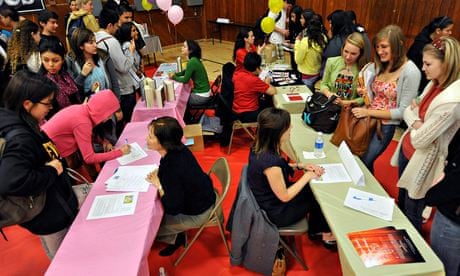Schools will be told that they must offer students more contact with "real employers" to provide careers "inspiration" and advice, according to a leaked draft of new government guidance seen by the Guardian.
The revised statutory guidance, currently in draft form but scheduled for release by the start of the new school year (and possibly within weeks), says schools should provide "sustained contacts" with employers, mentors, coaches and motivational speakers to inspire students with a sense of what they can achieve. In particular, schools should steer pupils towards careers requiring science and maths subjects, says the document.
Schools can keep any existing in-house arrangements on careers advice, but by law they must now bring in support from independent and external sources, the draft says. They will also be obliged to allow alternative providers, including colleges, apprenticeship providers and other schools – such as university technical colleges – to explain what they offer directly to pupils. This follows concerns that a desire to maintain rolls (and funding) means schools do not encourage students to consider switching to rival institutions.
The guidance, originally due in September, is significantly more prescriptive and detailed than the last version, published a year ago, and gives even more emphasis to how schools must work with employers to ensure students benefit from "direct, motivating and exciting experience of the world of work".
The focus on direct contact with the workplace reflects education secretary Michael Gove's view that schools and employers, rather than professional careers advisers, are the key players in helping pupils choose the right career path. Gove's decision to give schools responsibility – but no extra funding – for careers guidance has drawn criticism, including from MPs and employers, amid concern that young people are not receiving the advice they need to progress in an ever-evolving world of work.
A damning report by the schools inspectorate Ofsted, published last September, found that only one in four schools were providing adequate careers guidance, with the majority failing to offer a structured approach or dedicate enough money to the issue. Department for Education officials were scrambled to draw up new statutory guidance and give schools a clearer remit, but the new version has been repeatedly delayed.
It's likely that careers professionals will criticise the new statutory guidance because it avoids all reference to dedicated careers advisers – they have been "airbrushed out", according to one critic – and does not require schools to implement a quality-assured careers programme with professional national standards. They will raise concerns that relying on employer input will inevitably lead to a "postcode lottery" in which schools in some areas of the country will be able to access a wide range of work experience and contacts on their doorstep, while others will have far less available locally. The guidance contains no detailed parameters for how much employer contact students might expect.
There will also be concerns that there are no specific recommendations on how such contacts should be planned, monitored and evaluated within an overall careers programme.
With no indication that any extra funding will be available, schools – most having already set budgets for the next financial year – are likely to be concerned at the potential costs of the new requirement. They will have to offer a range of activities including employer talks, careers fairs, workplace visits and work experience, motivational speakers, college and university visits and advice from coaches and mentors. The guidance explicitly states that access to a careers advice website is not enough on its own to meet a school's legal obligations. Critics of the coalition policy on careers, including the charity Barnardo's, have warned that the most disadvantaged students are relying on websites and helplines which, in practice, they do not use.
The draft guidance states that schools should help all pupils with the appropriate talent and potential to go to university, aiming for the best institutions and courses if they can. However, it also says that schools should encourage high-ability students to consider apprenticeships as a "very high calibre" route into employment and higher education.
"Modern careers guidance is as much about inspiration and aspiration as it is about advice," says the draft. But as well as broadening students' horizons over work options, schools are told they should also ensure that students aim for jobs actually available in the labour market. "There is currently a mismatch between the careers that young people want to pursue and the opportunities available," the document states.

Comments (…)
Sign in or create your Guardian account to join the discussion